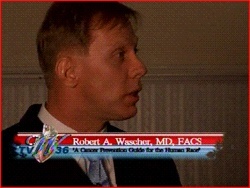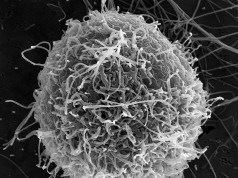By, Robert A. Wascher, MD, FACS
Updated: 05/23/2010
The information in this column is intended for informational purposes only, and does not constitute medical advice or recommendations by the author. Please consult with your physician before making any lifestyle or medication changes, or if you have any other concerns regarding your health.
Welcome to Weekly Health Update
“A critical weekly review of important new research findings for health-conscious readers
SOY & CURCUMIN REDUCE PROSTATE-SPECIFIC ANTIGEN (PSA)
Regular readers of this column are already aware that the regular consumption of foods containing soy isoflavones may be associated with a reduced risk of developing prostate cancer, and other types of cancer as well. Curcumin, as curry lovers know, is contained within the spice known as turmeric. Curcumin has been extensively studied, and it too may possess anti-cancer properties as well. Both of these dietary compounds are thought to have potent anti-inflammatory effects on the prostate gland, and on other organs of the body. Additionally, soy isoflavones also act weak estrogens (“phytoestrogens), and may suppress prostate gland activity on this basis too.
Prostate cancers, as well as the normal prostate gland cells that give rise to prostate cancer, produce PSA (prostate-specific antigen), which allows doctors to detect new or recurrent prostate cancers by measuring the level of PSA in the blood. A newly published research study, which appears in the current issue of the journal The Prostate, adds further evidence that soy isoflavones and curcumin may have an important role to play in prostate cancer prevention and, possibly, prostate cancer treatment.
This study consisted of both a laboratory experiment and a small clinical research trial with human volunteers. In the laboratory portion of this study, human prostate cancer cells were treated with soy isoflavones and curcumin. When these prostate cancer cells were treated with soy isoflavones and curcumin, the production of PSA by these cells was dramatically decreased. Moreover, a receptor for male sex hormones, which prostate cancers use to fuel their growth, was significantly suppressed following treatment of these cells with soy isoflavones and curcumin.
In the clinical portion of this research study, men who had undergone prostate gland biopsies due to an elevated PSA blood level, but who were subsequently found not to have prostate cancer, were also evaluated. In this prospective, randomized, placebo-controlled trial, 85 men without prostate cancer, but with elevated blood PSA levels, were divided into two groups. The “experimental group of men received curcumin and soy isoflavones once per day. The “control group of men received a placebo (“sugar pill) once per day. Neither group of male volunteers, nor the research assistants who dispensed these pills, knew which men received the placebo pills and which received the soy isoflavone and curcumin pills.
PSA levels were tested in all of these male volunteers at the beginning of the study, and 6 months later. Among the men randomized to receive daily supplements of soy isoflavones and curcumin, the level of PSA in their blood dramatically declined following 6 months of supplementation with soy isoflavones and curcumin.
While the results of this small and elegant research study do not prove that soy isoflavones and curcumin can actually prevent prostate cancer in humans, these results do suggest, at least, a biological mechanism whereby these dietary compounds might reduce the risk of developing prostate cancer, and might also have anti-cancer effects in patients with prostate cancer. However, only large-sale prospective, randomized, blinded, placebo-controlled human clinical trials will be able to prove that these dietary compounds can actually prevent or effectively treat prostate cancer.
At this time, there are multiple ongoing and recently completed prostate cancer prevention and treatment clinical research trials using soy isoflavone supplements. The results of several of these studies will, hopefully, become available within the next 3 to 5 years.
While there are multiple cancer prevention and cancer treatment research trials underway that are evaluating curcumin, none of these ongoing curcumin clinical trials are focused on prostate cancer, unfortunately.
Based upon the findings of this small and innovative research study of soy isoflavones and curcumin, the next logical step would be a large prospective, randomized, placebo-controlled, blinded study that randomizes patient volunteers to placebo, versus soy isoflavones only, versus curcumin only, versus a combination of soy isoflavones and curcumin. A cancer prevention study could look at prostate cancer incidence in men who are already at high risk of developing this common form of cancer. A prostate cancer treatment study, using the same methods, could assess the clinical impact of soy isoflavones and curcumin on the progression or recurrence of prostate cancer in men who have already been diagnosed with this form of cancer.
To learn more about the role of soy isoflavones and curcumin as potential cancer prevention nutrients, look for the publication of my new landmark evidence-based book, “A Cancer Prevention Guide for the Human Race, in the summer of this year.
I and the staff of Weekly Health Update would again like to take this opportunity to thank the nearly 120,000 new and returning readers who visited our premier global health information website last month. As always, we enjoy receiving your stimulating feedback and questions, and I will continue to try and personally answer as many of your inquiries as I possibly can.
Disclaimer: As always, my advice to readers is to seek the advice of your physician before making any significant changes in medications, diet, or level of physical activity
Dr. Wascher is an oncologic surgeon, professor of surgery, cancer researcher, oncology consultant, and a widely published author
For a different perspective on Dr. Wascher, please click on the following YouTube link:
https://youtube.com/watch?v=7-Tdv7XW0qg
(Anticipated Publication Date: Summer of 2010)
(Click above image for TV36 interview of Dr. Wascher)
Send your feedback to Dr. Wascher at:
Dr. Wascher’s Biography
Links to Other Health & Wellness Sites
Copyright 2007 – 2010
Robert A. Wascher, MD, FACS
All rights reserved
Dr. Wascher’s Archives:
5-16-2010: Coffee & the Risk of Death from Heart Disease & Cancer
5-9-2010: Soy Foods & Stomach Cancer Risk
5-2-2010: Chemotherapy for Breast Cancer & Memory Loss
4-25-2010: Smoking, Teenagers & Tobacco Company Advertising
4-18-2010: Coffee Improves HDL Cholesterol Levels
4-11-2010: Cruciferous Vegetables, Soy & Breast Cancer Risk
4-4-2010: Avodart (Dutasteride) & Prostate Cancer Prevention
3-28-2010: Aspirin & Breast Cancer Survival
3-21-2010: Obesity, Alcohol & Liver Disease
3-14-2010: Nuts, Diet & Obesity
3-7-2010: Walnuts, Cholesterol, LDL & Triglycerides
2-28-2010: Soy Isoflavones & Recurrent Prostate Cancer
2-21-2010: Testosterone Supplements in Frail Elderly Men
2-14-2010: Pancreatic Cancer Risk, Sodas & Juice
2-7-2010: Vitamin D, Cardiovascular Disease & Death
1-31-2010: Concord Grape Juice Improves Memory
1-24-2010: Mozart, Music, Babies & Health
1-17-2010: Breast Cancer, Physical Therapy & Lymphedema
1-10-2010: Prevention of Surgical Site Infections (SSIs) after Surgery
1-3-2010: Ginkgo Biloba, Memory & Cognitive Health
12-20-2009: CT Scans & Cancer Risk
12-13-2009: Soy Isoflavones Decrease Breast Cancer Recurrence Risk
12-6-2009: Salt (Sodium) Intake, Stroke & Cardiovascular Disease
11-29-2009: Exercise & Prostate Cancer Risk
11-22-2009: Genistein (Soy Isoflavone) & Prostate Cancer
11-15-2009: Breast Cancer Treatment & Chronic Pain
1-8-2009: Vitamin D & Breast Cancer Risk
11-1-2009: Exercise & Prostate Cancer Risk
10-25-2009: HPV Virus & Risk of Breast Cancer
10-18-2009: Post-Cholecystectomy Syndrome (Symptoms after Gallbladder Surgery)
10-11-2009: Vitamin D & Falls in the Elderly
10-4-2009: Surgery, NSQIP, Complications & Death
9-27-2009 Stress, Heart Disease, Exercise & Death
9-20-2009: Vitamin D & Colorectal Cancer Survival
9-13-2009: H1N1 Swine Flu Update
9-7-2009: Green Tea, Aging & Lifespan
8-30-2009: Irritable Bowel Syndrome (IBS), Diet & Fiber
8-23-2009: Update on Prostate Cancer and Cryotherapy
8-16-2009: Exercise Improves Lymphedema Symptoms in Breast Cancer Survivors
8-9-2009: Breast Cancer Recurrence, Death & Vitamin D
8-2-2009: Honesty, Dishonesty & Brain Function
7-26-2009: Coronary Artery CT Scans & Cancer Risk
7-19-2009: Hormone Replacement Therapy (HRT) & Ovarian Cancer
7-12-2009: Breast Cancer & Metformin (Glucophage)
7-5-2009: Prostate Cancer & Green Tea
6-28-2009: Air Pollution & the Risk of Deep Venous Thrombosis (DVT)
6-21-2009: Red Yeast Rice, Statins & Cholesterol
6-14-2009: Bone Marrow Stem Cell Transplant & Congestive Heart Failure (CHF)
6-7-2009: Diet, Soy & Breast Cancer Risk
5-31-2009: Diet and Prostate Cancer Risk
5-24-2009: Diabetes, Glucose Control & Death
5-17-2009: Drug Company Marketing & Physician Prescribing Bias
5-10-2009: Hemorrhoids & Surgery
5-3-2009: Statin Drugs & Blood Clots (Thromboembolism)
4-26-2009: Are We Really Losing the War on Cancer?
4-19-2009: Exercise in Middle Age & Risk of Death
4-12-2009: Can Chronic Stress Harm Your Heart?
4-5-2009: Does PSA Testing for Prostate Cancer Save Lives?
3-15-2009: Depression, Stress, Anger & Heart Disease
3-8-2009: Coronary Artery Disease: CABG vs. Stents?; Swimming Lessons & Drowning Risk in Children
3-1-2009: Aspirin & Colorectal Cancer Prevention; Fish Oil & Respiratory Infections in Children
2-22-2009: Health Differences Between Americans & Europeans; Lycopene & Prostate Cancer
2-15-2009: Statin Drugs & Death Rates; Physical Activity, Breast Cancer & Sex Hormones
2-8-2009: Hormone Replacement Therapy (HRT) & Breast Cancer; Stool DNA Testing & Cancer of the Colon & Rectum
1-25-2009: Prostate Cancer, Fatigue & Exercise; Does your Surgeon “Warm-up Before Surgery?
1-18-2009: Cancer and Vitamins; Teenagers, MySpace and Risky Behaviors
1-11-2009: Exercise Reverses Some Effects of Fatty Meals; Vitamin C and Blood Pressure
12-28-2008: Stress & Your Risk of Heart Attack; Vitamin D & the Prevention of Colon & Rectal Polyps
12-21-2008: Breast Cancer Incidence & Hormone Replacement Therapy; Circumcision & the Risk of HPV & HIV Infection
12-14-2008: Vitamin E, Vitamin C and Selenium Do Not Prevent Cancer; Postscript: A Possible Cure for Down’s Syndrome
12-7-2008: Generic vs. Brand-Name Drugs, Stress & Breast Cancer Survival
11-30-2008: A Possible Cure for Down’s Syndrome?; Smoking & Cognitive Decline; Calcium & Vitamin D & Breast Cancer Risk
11-23-2008: Breast Cancer & Fish Oil; Lymphedema after Breast Cancer Treatment; Vasectomy & Prostate Cancer Risk
11-9-2008: Statins Cut Heart Attack Risk Even with Normal Cholesterol Levels; Statins & PSA Level
11-2-2008: Radiation Treatment of Prostate Cancer & Second Cancers; Sexual Content on TV & Teen Pregnancy Risk
10-26-2008: Smoking & Quality of Life
10-19-2008: Agent Orange & Prostate Cancer
10-12-2008: Pomegranate Juice & Prostate Cancer
10-5-2008: Central Obesity & Dementia; Diet, Vitamin D, Calcium, & Colon Cancer
9-28-2008: Publication & Citation Bias in Favor of Industry-Funded Research?
9-21-2008: Does Tylenol® (Acetaminophen) Cause Asthma?
9-14-208: Arthroscopic Knee Surgery- No Better than Placebo?; A Healthy Lifestyle Prevents Stroke
8-23-2008: Alcohol Abuse Before & After Military Deployment; Running & Age; Running & Your Testicles
2-23-2008: Universal Healthcare Insurance Study; Glucosamine & Arthritis
2-3-2008: Vitamin D & Cardiovascular Health; Vitamin D & Breast Cancer; Green Tea & Colorectal Cancer
1-12-2008: Statins, Diabetes & Stroke and Obesity; GERD & Esophageal Cancer
12-31-2007: Minority Women, Hormone Replacement Therapy & Breast Cancer; Does Health Insurance Improve Health?







